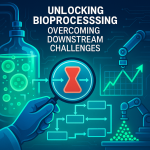🔬 According to Ioannis Papantoniou, PhD, automation, sensor technology, and analytics are necessary for training machine learning algorithms.
🧪 Papantoniou’s team used AI to study the growth kinetics of donor cells in bioreactor systems.
💡 To achieve meaningful AI, large amounts of data from multiple donors are required.
🌐 The adoption of new automated technologies, such as smart bioreactors and biosensors, is enabling advanced therapy industry to benefit from AI.
🏭 Papantoniou’s team is using a Horizon Europe grant to build a small factory for manufacturing organoids and controlling tissue development with AI.
🔮 In the future, AI may even be used for managing decentralized manufacturing sites in different countries.
Introduction:
The advanced therapy industry can benefit greatly from artificial intelligence (AI), but to fully utilize AI’s potential, robust hardware and monitoring software are necessary. Ioannis Papantoniou, an associate professor of tissue engineering and bioprocess development, explains that the implementation of automation, necessary sensor technology, and process control and analytics are vital for successful AI integration in advanced therapy manufacturing.
- Advanced therapy manufacturers need to have automation, necessary sensor technology, and process control and analytics in place before they can effectively utilize AI.
- Training machine learning algorithms requires vast amounts of data, which can be acquired through automation and monitoring systems.
- New technology, such as smart bioreactors and biosensors, enables the collection of more data, expanding the range of quality attributes that can be measured.
- AI can be used to predict complex cell behavior and control manufacturing processes, allowing for more efficient and accurate production of advanced therapies.
- In the future, AI may be used to manage decentralized manufacturing at multiple sites located in different countries.
Conclusion:
Implementation of automation, sensor technology, and process control and analytics is essential for advanced therapy manufacturers to fully benefit from AI. With the ability to collect and analyze vast amounts of data, AI can significantly improve the prediction and control of complex cell behavior in the manufacturing process. As technology continues to advance, the integration of AI in advanced therapy manufacturing is expected to become more feasible and widespread.



